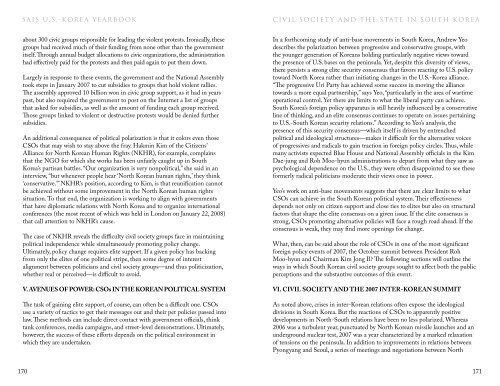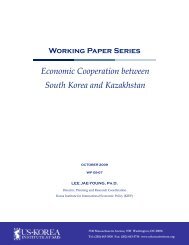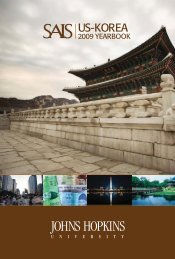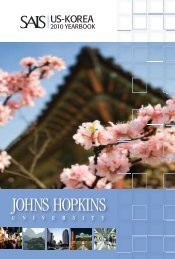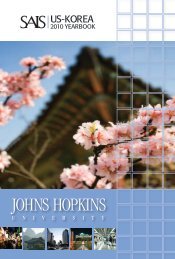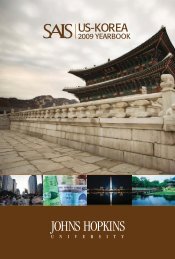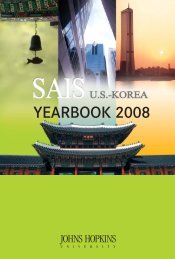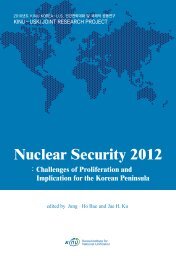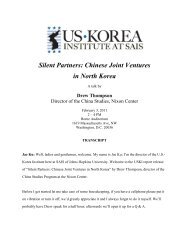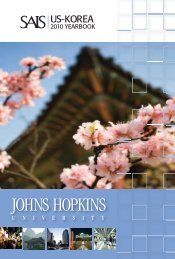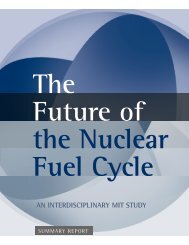Civil Society and the State in South Korea, by Michael Richardson
Civil Society and the State in South Korea, by Michael Richardson
Civil Society and the State in South Korea, by Michael Richardson
Create successful ePaper yourself
Turn your PDF publications into a flip-book with our unique Google optimized e-Paper software.
SAIS U.S.-KOREA YEARBOOK<br />
CIVIL SOCIETY AND THE STATE IN SOUTH KOREA<br />
about 300 civic groups responsible for lead<strong>in</strong>g <strong>the</strong> violent protests. Ironically, <strong>the</strong>se<br />
groups had received much of <strong>the</strong>ir fund<strong>in</strong>g from none o<strong>the</strong>r than <strong>the</strong> government<br />
itself. Through annual budget allocations to civic organizations, <strong>the</strong> adm<strong>in</strong>istration<br />
had effectively paid for <strong>the</strong> protests <strong>and</strong> <strong>the</strong>n paid aga<strong>in</strong> to put <strong>the</strong>m down.<br />
Largely <strong>in</strong> response to <strong>the</strong>se events, <strong>the</strong> government <strong>and</strong> <strong>the</strong> National Assembly<br />
took steps <strong>in</strong> January 2007 to cut subsidies to groups that hold violent rallies.<br />
The assembly approved 10 billion won <strong>in</strong> civic group support, as it had <strong>in</strong> years<br />
past, but also required <strong>the</strong> government to post on <strong>the</strong> Internet a list of groups<br />
that asked for subsidies, as well as <strong>the</strong> amount of fund<strong>in</strong>g each group received.<br />
Those groups l<strong>in</strong>ked to violent or destructive protests would be denied fur<strong>the</strong>r<br />
subsidies.<br />
An additional consequence of political polarization is that it colors even those<br />
CSOs that may wish to stay above <strong>the</strong> fray. Hakm<strong>in</strong> Kim of <strong>the</strong> Citizens’<br />
Alliance for North <strong>Korea</strong>n Human Rights (NKHR), for example, compla<strong>in</strong>s<br />
that <strong>the</strong> NGO for which she works has been unfairly caught up <strong>in</strong> <strong>South</strong><br />
<strong>Korea</strong>’s partisan battles. “Our organization is very nonpolitical,” she said <strong>in</strong> an<br />
<strong>in</strong>terview, “but whenever people hear ‘North <strong>Korea</strong>n human rights,’ <strong>the</strong>y th<strong>in</strong>k<br />
‘conservative.’” NKHR’s position, accord<strong>in</strong>g to Kim, is that reunification cannot<br />
be achieved without some improvement <strong>in</strong> <strong>the</strong> North <strong>Korea</strong>n human rights<br />
situation. To that end, <strong>the</strong> organization is work<strong>in</strong>g to align with governments<br />
that have diplomatic relations with North <strong>Korea</strong> <strong>and</strong> to organize <strong>in</strong>ternational<br />
conferences (<strong>the</strong> most recent of which was held <strong>in</strong> London on January 22, 2008)<br />
that call attention to NKHR’s cause.<br />
The case of NKHR reveals <strong>the</strong> difficulty civil society groups face <strong>in</strong> ma<strong>in</strong>ta<strong>in</strong><strong>in</strong>g<br />
political <strong>in</strong>dependence while simultaneously promot<strong>in</strong>g policy change.<br />
Ultimately, policy change requires elite support. If a given policy has back<strong>in</strong>g<br />
from only <strong>the</strong> elites of one political stripe, <strong>the</strong>n some degree of <strong>in</strong>terest<br />
alignment between politicians <strong>and</strong> civil society groups—<strong>and</strong> thus politicization,<br />
whe<strong>the</strong>r real or perceived—is difficult to avoid.<br />
V. AVENUES OF POWER: CSOs IN THE KOREAN POLITICAL SYSTEM<br />
The task of ga<strong>in</strong><strong>in</strong>g elite support, of course, can often be a difficult one. CSOs<br />
use a variety of tactics to get <strong>the</strong>ir messages out <strong>and</strong> <strong>the</strong>ir pet policies passed <strong>in</strong>to<br />
law. These methods can <strong>in</strong>clude direct contact with government officials, th<strong>in</strong>k<br />
tank conferences, media campaigns, <strong>and</strong> street-level demonstrations. Ultimately,<br />
however, <strong>the</strong> success of <strong>the</strong>se efforts depends on <strong>the</strong> political environment <strong>in</strong><br />
which <strong>the</strong>y are undertaken.<br />
In a forthcom<strong>in</strong>g study of anti-base movements <strong>in</strong> <strong>South</strong> <strong>Korea</strong>, Andrew Yeo<br />
describes <strong>the</strong> polarization between progressive <strong>and</strong> conservative groups, with<br />
<strong>the</strong> younger generation of <strong>Korea</strong>ns hold<strong>in</strong>g particularly negative views toward<br />
<strong>the</strong> presence of U.S. bases on <strong>the</strong> pen<strong>in</strong>sula. Yet, despite this diversity of views,<br />
<strong>the</strong>re persists a strong elite security consensus that favors react<strong>in</strong>g to U.S. policy<br />
toward North <strong>Korea</strong> ra<strong>the</strong>r than <strong>in</strong>itiat<strong>in</strong>g changes <strong>in</strong> <strong>the</strong> U.S.-<strong>Korea</strong> alliance.<br />
“The progressive Uri Party has achieved some success <strong>in</strong> mov<strong>in</strong>g <strong>the</strong> alliance<br />
towards a more equal partnership,” says Yeo, “particularly <strong>in</strong> <strong>the</strong> area of wartime<br />
operational control. Yet <strong>the</strong>re are limits to what <strong>the</strong> liberal party can achieve.<br />
<strong>South</strong> <strong>Korea</strong>’s foreign policy apparatus is still heavily <strong>in</strong>fluenced <strong>by</strong> a conservative<br />
l<strong>in</strong>e of th<strong>in</strong>k<strong>in</strong>g, <strong>and</strong> an elite consensus cont<strong>in</strong>ues to operate on issues perta<strong>in</strong><strong>in</strong>g<br />
to U.S.-<strong>South</strong> <strong>Korea</strong>n security relations.” Accord<strong>in</strong>g to Yeo’s analysis, <strong>the</strong><br />
presence of this security consensus—which itself is driven <strong>by</strong> entrenched<br />
political <strong>and</strong> ideological structures—makes it difficult for <strong>the</strong> alternative voices<br />
of progressives <strong>and</strong> radicals to ga<strong>in</strong> traction <strong>in</strong> foreign policy circles. Thus, while<br />
many activists expected Blue House <strong>and</strong> National Assembly officials <strong>in</strong> <strong>the</strong> Kim<br />
Dae-jung <strong>and</strong> Roh Moo-hyun adm<strong>in</strong>istrations to depart from what <strong>the</strong>y saw as<br />
psychological dependence on <strong>the</strong> U.S., <strong>the</strong>y were often disappo<strong>in</strong>ted to see <strong>the</strong>se<br />
formerly radical politicians moderate <strong>the</strong>ir views once <strong>in</strong> power.<br />
Yeo’s work on anti-base movements suggests that <strong>the</strong>re are clear limits to what<br />
CSOs can achieve <strong>in</strong> <strong>the</strong> <strong>South</strong> <strong>Korea</strong>n political system. Their effectiveness<br />
depends not only on citizen support <strong>and</strong> close ties to elites but also on structural<br />
factors that shape <strong>the</strong> elite consensus on a given issue. If <strong>the</strong> elite consensus is<br />
strong, CSOs promot<strong>in</strong>g alternative policies will face a rough road ahead. If <strong>the</strong><br />
consensus is weak, <strong>the</strong>y may f<strong>in</strong>d more open<strong>in</strong>gs for change.<br />
What, <strong>the</strong>n, can be said about <strong>the</strong> role of CSOs <strong>in</strong> one of <strong>the</strong> most significant<br />
foreign policy events of 2007, <strong>the</strong> October summit between President Roh<br />
Moo-hyun <strong>and</strong> Chairman Kim Jong Il The follow<strong>in</strong>g sections will outl<strong>in</strong>e <strong>the</strong><br />
ways <strong>in</strong> which <strong>South</strong> <strong>Korea</strong>n civil society groups sought to affect both <strong>the</strong> public<br />
perceptions <strong>and</strong> <strong>the</strong> substantive outcomes of this event.<br />
VI. CIVIL SOCIETY AND THE 2007 INTER-KOREAN SUMMIT<br />
As noted above, crises <strong>in</strong> <strong>in</strong>ter-<strong>Korea</strong>n relations often expose <strong>the</strong> ideological<br />
divisions <strong>in</strong> <strong>South</strong> <strong>Korea</strong>. But <strong>the</strong> reactions of CSOs to apparently positive<br />
developments <strong>in</strong> North-<strong>South</strong> relations have been no less polarized. Whereas<br />
2006 was a turbulent year, punctuated <strong>by</strong> North <strong>Korea</strong>n missile launches <strong>and</strong> an<br />
underground nuclear test, 2007 was a year characterized <strong>by</strong> a marked relaxation<br />
of tensions on <strong>the</strong> pen<strong>in</strong>sula. In addition to improvements <strong>in</strong> relations between<br />
Pyongyang <strong>and</strong> Seoul, a series of meet<strong>in</strong>gs <strong>and</strong> negotiations between North<br />
170 171


